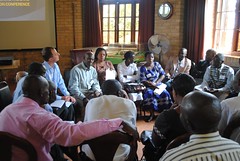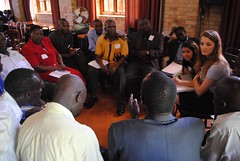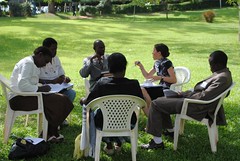At the same time we were boarding the plane in Dallas, pastors and administrators from 50 churches all over Uganda were packing their bags and boarding buses bound for Mukono, the home of Uganda Christian University. Some were representing large, well established churches. Others could fit their congregations inside a small house. Their destination would be the two-day “Mastering the Land” conference organized by Pastors Discipleship Network, an organization founded by Compassion Leadership Development Program graduate and Moody Bible Institute Scholar Richmond Wandera.


While our friends at Pastors Discipleship Network coordinated all of the logistics of identifying pastors and getting them to Mukono (It remains a mystery to me how they were able to accomplish this feat), our group was responsible for the vast majority of the content, which focused on teaching Biblical principles of financial stewardship and introducing simple budgeting and accounting systems.
We started the first day with worship and prayer, and then got right down to business with a wide-ranging survey of the pastors the gauge their beliefs about money and its place in their lives and in their churches. Baylor students wrote the survey questions in an effort to tailor the content to the areas that would be of greatest benefit to the pastors. The 2009 and 2010 groups also met with pastors and were surprised to learn that many pastors do not even own a complete Bible with all 63 books intact. They also learned of a general disdain for entrepreneurial activities in some congregations because it can be viewed as inconsistent Christianity. This year, the comprehensive surveys allowed us to see a more complete picture of the pastors’ beliefs, which in many areas we found to be largely consistent with the message the Bible gives us. In other areas, we observed some challenging cultural differences which we attempted to address during the two days.
We divided the pastors into seven groups, according to the level of sophistication of churches’ accounting systems. Members of our team joined each group and facilitated discussions among the pastors. I was drafted to join the group of pastors of churches that had kept accounting records for five years or longer. We started as a group of around 20, and late arrivers came in throughout the day to bring our total to around 35.


It didn’t take long for us to get into some pretty intense discussion about all sorts of financial issues the pastors were facing. Although this group was the most financially sophisticated, most of them did not have bank accounts for either themselves or for their churches. Most of the pastors don’t receive salaries, but instead commingle church and personal funds. In some ways, commingling is inevitable because the churches aren’t set up as separate legal entities. The cost of this is an often prohibitive $150. The typical Sunday collection for many of the churches amounts to $10 or $20, which starts to explain the salary issue. There’s a downward trend in offerings that reflects the deteriorating financial state of the average Ugandan family.
The worldwide economic crisis is most definitely impacting Uganda. Foreign aid has decreased as wealthier nations are using more of their resources to address their own problems. This fact alone is somewhat of a hardship, but it is compounded by the impact on currency exchange rates. The reduction of inflows of foreign money (denominated in other currencies) means there is reduced demand for the Ugandan shilling, resulting in a lower value as compared to other currencies. This causes higher prices for imported goods and services, like gasoline and construction materials, which then results in increased domestic food prices, for example, because the cost of transportation is higher. The average Ugandan’s disposable income, to the extent that there was any to begin with, is now quite a bit lower because the cost of living has increased so dramatically over the last year or so.
Church members in need are increasingly coming to their pastors with requests for assistance, and they feel obligated to issue loans either from church or personal funds. Sometimes they get repaid, and sometimes the borrowers mysteriously disappear before paying back their loans. Some say they move on to another church to borrow more. Just about every pastor also plays the role of creditor, two roles that are very different.
“The rich rules over the poor, And the borrower becomes the lender's slave,” Proverbs 22:7. There are lots of verses in the Bible that say we should be generous to those who come to us asking for help. We think that it would be better for the pastors to only give money when they’re in a position to expect nothing in return (Luke 6:35). That way it wouldn’t be a severe hardship when the money doesn’t come back in. By setting aside church funds in advance for what we would call benevolence, they can plan for situations that will inevitably arise and maintain the integrity of other areas of the church budget. This is an easy principle to understand, but we learned that it’s much harder to implement when resources are so extremely tight and when the needs of some families are so great. These pastors have such a selfless desire to help their congregations that really leave no margin at all for themselves. This is a level of sacrifice that is uncommon among the people that I know, especially myself.
Our suggestion to these pastors was to form separate legal entities for their churches since most of them have not already done so. The Pastors Discipleship Network has established a program to provide legal and financial assistance to enable them to do this. Once the church funds are set aside in their own entities, finance committees should be formed to oversee the churches’ budgets and spending. These budgets need to include salaries for the pastors. If the salaries are not large enough to fully support the pastors, then they might need to supplement their incomes with other activities.
On the second day, we talked about entrepreneurial activities that pastors could engage in, as well as teach to their congregations, to help improve the standard of living of the churches. We also taught them a little about debits and credits. I’ll write more about that in the next post.

No comments:
Post a Comment